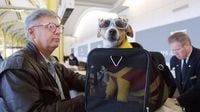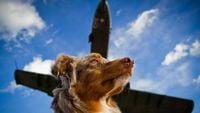In a groundbreaking move for pet owners across Italy, the National Civil Aviation Authority (Enac) will officially allow all dogs and cats to travel in the cabin of airplanes starting May 12, 2025. This new regulation signifies a major shift in air travel policies, permitting even medium and large pets to accompany their owners in the passenger area, rather than being confined to the often stressful and uncomfortable pressurized hold.
The announcement, heralded by the Ministry of Infrastructure and Transport, has been met with enthusiasm from animal welfare advocates and pet owners alike. Matteo Salvini, the Minister of Infrastructure, expressed his satisfaction with the impending approval, stating that this change represents a significant improvement for millions of Italians who travel with their pets.
Currently, airlines have strict limitations on the size and weight of animals allowed in the cabin. Typically, pets must fit into a carrier that can be placed at the foot of the seat, weighing between 7 and 10 kilograms, including the carrier. However, the new regulations will allow larger pets to travel in specially designed carriers that can be secured in the cabin, either under the seat or above it, as long as the combined weight does not exceed that of an average passenger.
According to the updated rules, pets must be housed in a secure carrier, which can be fastened using seat belts or other anchoring systems. This flexibility aims to enhance the travel experience for both pets and their owners, reducing the anxiety and discomfort often associated with air travel in the hold. The previous requirement for larger animals to be transported in the hold has frequently led to owners resorting to sedatives or avoiding air travel altogether, favoring longer journeys by car or train.
"This is a long-awaited and sensible decision that recognizes the bond between pets and their owners," said an official from the National Animal Protection Agency (Enpa). The organization has advocated for such changes for years, emphasizing that traveling with pets should not involve conditions of confinement but rather allow for companionship and comfort.
As the new rules come into effect, it remains to be seen how individual airlines will adapt. Currently, each airline sets its own policies regarding the number of animals allowed in the cabin, the type of carriers permitted, and any additional fees that may apply. For instance, some low-cost airlines have historically barred pets from traveling in the cabin altogether, citing logistical challenges associated with handling animals during boarding and disembarking.
With the new regulations, airlines may need to revise their policies to accommodate a broader range of pets. This could include determining whether the use of a seat for a pet carrier will incur a full ticket price, which remains a significant concern for many travelers.
In the lead-up to the summer travel season, this change is particularly timely. The number of pet owners in Italy has been steadily increasing, with estimates suggesting there are over 65 million pets across the country, including nearly 12 million cats and 9 million dogs. A recent study by the London School of Economics and Kent University highlighted that the companionship of a pet can enhance a person's sense of well-being, equating it to an annual salary increase of €80,000.
As Italy embraces this new era of pet-friendly travel, it reflects a growing recognition of the importance of animal welfare and the human-animal bond. The upcoming changes are expected to not only improve the travel experience for pets but also alleviate the stress and anxiety their owners have faced in the past.
While the specifics of the new regulations will be clarified in the coming days, the overarching theme is clear: traveling with pets will soon be a more accessible and humane experience. The Enac's decision marks a significant step forward in aligning Italy's air travel policies with the evolving needs of pet owners and their furry companions.





